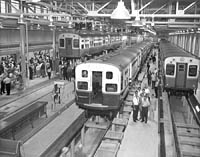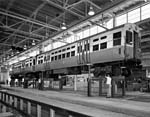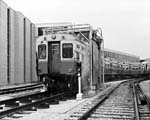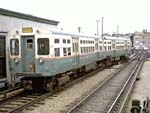
|
cta6000s@Touhy02.jpg
(156k)
The first six 6000-series
cars, led by 6005-6006, are undergoing performance tests on
October 20, 1950 in this view at the curve in the North
Side Main Line at Touhy Avenue. The cars, which had been
delivered just two months before, underwent months of tests
and analysis before being first assigned to the Logan
Square-Loop route. The front cars represent the second
version of the 6000-series
paint scheme -- and the one first used to a large extent --
with the standee window band going all the way around the
front of the car. The earlier prototype version, where the
band terminates in a rounded end at the motorman's window,
can be seen in cars further back. (Photo
from the Graham Garfield Collection)
|

|
ROW@Armitage01.jpg
(133k)
By the mid-1950s, 6000-series
cars were providing the majority of service on both the
Ravenswood and North-South routes, making the North Side
Main Line an ideal spot for PCC car fans. South of Armitage,
where the State
Street Subway joins the elevated, Ravenswood trains pass
on the outside tracks as a northbound Howard "A" train
emerges from the incline. Note that the Howard train has a
"Baseball Today" sign on its front chains and that the Rave
trains are using the outside tracks south of the incline,
which are out of service today. (Photo from
the CTA Collection)
|

|
DesplainesShops02.jpg
(156k)
To celebrate the opening of the new Desplaines Shops, an
open house was held on July 27, 1962 to show off the
facilities to CTA®
employees, their families, and guests. In addition to the
maintenance bay, visitors got to see CTA's latest cars, the
6000-series (note in the middle foreground is one of the
high-speed experimental cars), and see them up on the
hoists. (Photo from the CTA
Collection)
|

|
DesplainesShops03.jpg
(127k)
PCC cars 6285-86 are up on the hoist inside Desplaines Shops
for inspection in 1962. Many of the older shops had hoists
that could only lift one car at a time, a fine arrangement
when cars were all single units but less convenient once
CTA® started ordering
nearly all its cars as married pair units. As 6285-86
demonstrate here, Desplaines Shops' hoists can lift two cars
together five feet off the ground to give repairmen
unrestricted access easily. (Photo from the
CTA Collection)
|

|
DesplainesShops-CarWasher01.jpg
(119k)
A train of 6000-series
cars is seen going through the car washer built as part of
Desplaines Shops. The photo was retouched by the
CTA® (most noticeably
on the #1 end panels of the front car and to accentuate the
spray, which would otherwise be less prominently visible),
probably for use in a publication. (Photo
from the CTA Collection)
|

|
howard05.jpg
(126k)
The east side of Howard
Yard is seen looking southeast from Juneway Terrance in
1965. Parked in the yard are several 4000-series
cars, with a 6000-series
car on the turning loop/yard lead. With the expansion of
Howard Yard in the early 1990s, the apartments on the left
side of the alley are now gone and this view would be
looking directly at the Howard Shops
building. (Photo by Miles
Beitler)
|

|
ROW@Cornelia-c1970.jpg
(129k)
This view looking south from the Addison Street overpass
shows the newly-opened Kennedy
Extension looking south at approximately Cornelia Street
circa 1970. When the extension opened, the West-Northwest
Route was operated with a mixture of 6000-series
cars, seen here in two passing 6-car trains, and 2200-series
cars, but since the two cars series were not
electrically-compatible they could not be mixed in the same
train consist. (Photo from the CTA
Collection)
|

|
cta6000int01.jpg
(90k)
This candid "everyday moment" photo shows three passengers
riding in the back of a 6000-series
car circa 1966. Although the last two digits of the car
number glass are obscured by the stanchion, we can see that
this is a car numbered in the 6500's. And was know that
whatever the last two digits in the car number are, it is an
even number since in the last 250 6000s
(6471-6720) the conductor's position, missing in this view,
was in the #2 (back) end of the odd-numbered car, or the "A"
car, in the pair. (Photo by Miles
Beitler)
|

|
cta6056.jpg
(88k)
By the 1960s, with all 770 cars delivered, the PCC "L" cars
became ubiquitous on the North Side lines. Here, one of the
first cars, 1950-built car 6056, is southbound on a
Ravenswood All-Stop run nearing Belmont
station in August, 1966, passing another 6000-series
train running northbound on the Englewood-Howard "A"
service. Car 6056 originally had dual dash-mounted
headlights, and while the first 200 6000-series
had their headlights retrofit above their end doors to match
the other 520 6000s, the
patched holes are still evident on the car's front end.
(Photo by Jerry Appleman)
|

|
cta6019-20.jpg
(92k)
A 6000-series
married-pair, cars 6019-20, is arriving into Kimball
terminal at the end of a Ravenswood "A" run in May, 1964.
Still retaining their original dash-mounted headlights, the
cars are pulling into the side track at Kimball,
usually used for trains going out of service or to be laid
up in the yard. The yard's maintenance shop is seen
alongside the train. (Photo by Jerry
Appleman)
|









